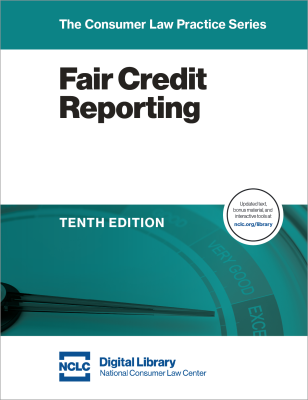In January 2024, the CFPB issued two important advisory opinions clarifying a number of critical issues under the Fair Credit Reporting Act (FCRA). Both opinions are effective as of January 23, 2024.
The first advisory opinion addresses accuracy issues in background check reports, which are used by most employers and landlords to screen workers and renters. The second advisory opinion addresses file disclosure issues concerning consumer reporting agencies (CRAs) generally. Practitioners who litigate FCRA cases should read both advisory opinions carefully.
CFPB Advisory Opinion: Accuracy in Background Check Reports
The first advisory opinion addresses several problematic issues that frequently arise with respect to criminal records and, in the case of tenant screening reports, eviction records. See CFPB, Advisory Opinion on Fair Credit Reporting; Background Screening, 89 Fed. Reg. 4171 (Jan. 23, 2024) (FCRA Background Screening AO).
These same issues are also examined in detail in three NCLC reports and an NCLC article; this article cites to them frequently:
- NCLC, Report, Broken Records Redux: How Errors by Criminal Background Check Companies Continue to Harm Consumers Seeking Jobs and Housing (2019) (“Broken Records”);
- NCLC, Report, Digital Denials: How Abuse, Bias, and Lack of Transparency in Tenant Screening Harm Renters (2023) (“Digital Denials”);
- NCLC, Report, Zombie Records: How Sealed or Expunged Court Records in Tenant & Employment Screening Reports May Illegally Cost People Jobs & Housing (2022) (“Zombie Records”); and
- Cohn, Brennan & Nelson, FCRA Remedies When Criminal Records Lead to Rental Denials (Sept. 21, 2023) (“FCRA Remedies for Rental Denials”).
—Reporting of Expunged, Sealed, or Otherwise Legal Restricted Public Records
About forty-five states now allow people to expunge, seal, or set aside certain convictions in some circumstances. These laws are intended to give consumers a fresh start, recognizing that lingering criminal records are a barrier to housing, jobs, and economic stability, and that criminal records often are not useful predictors of someone’s ability to be a successful tenant or employee. Similarly, a number of states allow sealing of eviction records or automatically seal them in certain circumstances.
Unfortunately, background check CRAs sometimes include sealed or expunged records in the consumer reports they provide to employers or landlords. See NCLC’s Fair Credit Reporting §§ 4.3.5.2, 4.4.6.5.2; Zombie Records; Broken Records at 19–20; FCRA Remedies for Rental Denials.
The CFPB advisory opinion makes clear that background reports should not contain records that have “been expunged, sealed, or otherwise legally restricted from public access” and that a CRA violates § 1681e(b) if it fails to follow reasonable procedures to prevent such records from appearing in consumer reports. FCRA Background Screening AO, 89 Fed. Reg. 4171, at 4172 (Jan. 23, 2024).
—Reporting of Disposition Information
A common error in background reports is CRAs’ failure to update public records information, resulting in the reporting of outdated records and stale data. See NCLC’s Fair Credit Reporting §§ 4.3.5.2, 4.4.6.5.2, 4.4.7; Broken Records at 20; Digital Denials at 32, 44; FCRA Remedies for Rental Denials. This often occurs due to the CRA’s failure to purchase updates from public records vendors or reliance on automated record scraping that ignores subsequent developments in a legal case. Thus, a background check report might report the filing of criminal charges without reporting a dismissal or a tenant screening report might include the filing of an eviction case without noting that the case was vacated or otherwise decided in the tenant’s favor. Id.
The CFPB advisory opinion makes clear that such practices violate the FCRA. A CRA must have reasonable procedures to include “any existing disposition information if it reports arrests, criminal charges, eviction proceedings, or other court filings.” FCRA Background Screening AO, 89 Fed. Reg. 4171, at 4172 (Jan. 23, 2024). A CRA violates § 1681e(b) if it reports on the latter types of information without procedures to search for and report on outcome information. Thus, for example, in the case of dismissed charges, “it is misleading and inaccurate to report that an individual has been arrested for the charges without also reporting that the charges have been dismissed.” Id. at 4174.
—Deceptively Duplicative Records
Background reports commonly contain multiple entries for the same criminal case, which can cause different stages of a criminal proceeding—such as arrest, charge, conviction or acquittal, and release from confinement—to appear as multiple different and separate offenses. See NCLC’s Fair Credit Reporting § 4.3.8; Broken Records at 36; FCRA Remedies for Rental Denials. Similarly, there could be multiple entries for the same eviction case. In some instances, duplicative entries are because the CRA or its vendor obtains information from multiple sources.
The CFPB advisory opinion requires that, when a CRA reports multiple stages of the same court proceeding, “it must have procedures in place to ensure that information regarding the stages of these court proceedings (such as an arrest followed by a conviction) is presented in a way that makes clear the stages all relate to the same proceeding or case and does not inaccurately suggest that multiple proceedings or cases have occurred.” FCRA Background Screening AO, 89 Fed. Reg. 4171, at 4174 (Jan. 23, 2024). If duplicate records caused by a CRA collecting information from multiple sources, the CRA “must take particular care to identify information that is duplicative to ensure that information is accurately presented in consumer reports.” Id.
—Seven-Year Reporting Period for Public Records
Section 1681c(a) of the FCRA limits the reporting of most adverse information to seven years. The exceptions are for bankruptcies, which can be reported for ten years and criminal convictions which can be reported indefinitely. Thus, arrests and criminal charges are subject to the seven-year limit, as are eviction cases. See NCLC’s Fair Credit Reporting §§ 5.2.3.6, 5.2.3.8.2.
The CFPB advisory opinion makes clear that a CRA must calculate the seven-year period from date of entry and is prohibited from using the disposition date as the trigger date. FCRA Background Screening AO, 89 Fed. Reg. 4171, at 4172–4173 (Jan. 23, 2024). Thus, for example, a CRA cannot report an arrest for up to seven years from the date of dismissal, rather than from the date of the arrest record. Otherwise, reporting from the disposition date effectively extends the seven-year obsolescence period.
—Private Remedies for Violations
Finally, and perhaps most importantly, the CFPB advisory opinion cautions that violation of FCRA § 1681e(b) by engaging in any of the above practices that the opinion addresses could be considered a willful violation under FCRA § 1681n. The CFPB states:
As with any guidance issued by the CFPB on the FCRA, or predecessor agencies that were responsible for administering the FCRA prior to the CFPB’s creation, consumer reporting agencies risk liability under section 616 [§ 1681n] if they violate the FCRA in a manner described in this advisory opinion, regardless of whether the consumer reporting agencies were previously liable for willful violations prior to its issuance.
FCRA Background Screening AO, 89 Fed. Reg. 4171 (Jan. 23, 2024).
CFPB Advisory Opinion: File Disclosures
The second CFPB advisory opinion addresses the requirement in FCRA § 1681g that credit bureaus, background check agencies, and other CRAs provide consumer file disclosures. CFPB, Advisory Opinion on Fair Credit Reporting; File Disclosures, 89 Fed. Reg. 4167 (Jan. 23, 2024) (FCRA File Disclosures AO). These file disclosures are commonly referred to as credit reports, background check reports, or tenant screening reports. The FCRA File Disclosures AO addresses a number of long-standing problems with respect to file disclosures. See generally NCLC’s Fair Credit Reporting Ch. 3.
—Specificity of File Disclosure Request
According to the CFPB, some industry stakeholders have taken the position that consumers must use specific language to request file disclosures under FCRA § 1681g(a), such as using the term “complete file.” FCRA File Disclosures AO, 89 Fed. Reg. 4167, at 4169 (Jan. 23, 2024). The CFPB advisory opinion rejects that position, making clear that consumers who request file disclosures need not use certain specific words, such as “request” or “file” or “complete file.” Id.
This guidance is supported by cases on this issue. See NCLC’s Fair Credit Reporting § 3.6.1. This portion of the advisory opinion will address a problem reported by tenants’ rights advocates where tenant screening CRAs only provide partial disclosures when rejected applicants ask to see “the criminal background check” or the “credit report” rather than asking for the full file.
—Complete File Disclosure When a Score or Summary Is Used
In some cases, a user such as a landlord only receives a summary of information, such as a tenant screening score or recommendation. The CFPB advisory opinion states that FCRA § 1681g(a)(1)’s requirement to disclose to the consumer “all information in the consumer’s file at the time of the request” means that, even when a user only received a score or summary, the CRA must disclose all information that formed the basis of the score or summary. FCRA File Disclosures AO, 89 Fed. Reg. 4167, at 4170 (Jan. 23, 2024).
—Disclosure of Information in the Format Provided to the User
The CFPB advisory opinion notes that FCRA § 1681g(a) requires a CRA to provide a consumer with a file disclosure that accurately reflects the information the CRA provided or might provide to a user. FCRA File Disclosures AO, 89 Fed. Reg. 4167, at 4170 (Jan. 23, 2024). Thus, for example, a CRA must provide a file disclosure that “allows the consumer to see criminal history information in the format that users see or will see it, so that the consumer can check for any inaccuracies and exercise their rights to dispute any information that may be inaccurate as presented to users (such as duplicative listings for a single case).” Id.
Requiring that information be disclosed to the consumer in the same format that users such as landlords and employers see will make it easier for rejected applicants and their advocates to discern what information caused or contributed to a denial and what did not.
—Disclosure of Public Records Vendors and Other Sources of Information
FCRA §1681g(a)(2) requires a CRA to disclose the “sources of information” for a consumer’s file. See NCLC’s Fair Credit Reporting § 3.6.4.2. In the case of public records, oftentimes a CRA obtains information from a third-party vendor, such as LexisNexis. However, the CRAs regularly fail to disclose the vendor’s involvement as the source of information and instead solely list the court as the source of records. Id.
The CFPB advisory opinion makes clear that the duty to disclose sources of the information in a consumer’s file includes “both the original source and any intermediary or vendor source (or sources) that provide the item of information from the original source to the consumer reporting agency.” FCRA File Disclosures AO, 89 Fed. Reg. 4167, at 4170 (Jan. 23, 2024). Requiring disclosure of vendors or other intermediate sources is critical to secure upstream corrections or deletions of improper information, which vendors often sell to several CRAs.
—Private Remedies for Violations
As with the CFPB advisory opinion on accuracy in background check reports, the advisory opinion on file disclosures cautions that violation of FCRA § 1681g by engaging in any of the above practices that the opinion prohibits could be considered a willful violation of the FCRA under § 1681n. FCRA File Disclosures AO, 89 Fed. Reg. 4167, at 4171 (Jan. 23, 2024).
Acknowledgements
The authors would like to thank Eric Dunn from the National Housing Law Project for his insights and assistance with this article.



